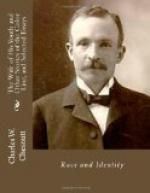“Why, dear mammy,” said the young woman musingly, “did you not find me, and restore me to my people?”
“Alas, child! I was not white, and when I was picked up from the water, after floating miles down the river, the man who found me kept me prisoner for a time, and, there being no inquiry for me, pretended not to believe that I was free, and took me down to New Orleans and sold me as a slave. A few years later the war set me free. I went to St. Louis but could find no trace of you. I had hardly dared to hope that a child had been saved, when so many grown men and women had lost their lives. I made such inquiries as I could, but all in vain.”
“Did you go to the orphan asylum?”
“The orphan asylum had been burned and with it all the records. The war had scattered the people so that I could find no one who knew about a lost child saved from a river wreck. There were many orphans in those days, and one more or less was not likely to dwell in the public mind.”
“Did you tell my people in Virginia?”
“They, too, were scattered by the war. Your uncles lost their lives on the battlefield. The family mansion was burned to the ground. Your father’s remaining relatives were reduced to poverty, and moved away from Virginia.”
“What of my mother’s people?”
“They are all dead. God punished them. They did not love your father, and did not wish him to marry your mother. They helped to drive him to his death.”
“I am alone in the world, then, without kith or kin,” murmured Clara, “and yet, strange to say, I am happy. If I had known my people and lost them, I should be sad. They are gone, but they have left me their name and their blood. I would weep for my poor father and mother if I were not so glad.”
Just then some one struck a chord upon the piano in the hall, and the sudden breaking of the stillness recalled Clara’s attention to the lateness of the hour.
“I had forgotten about the class,” she exclaimed. “I must go and attend to them.”
They walked along the corridor and entered the hall. Dr. Winthrop was seated at the piano, drumming idly on the keys.
“I did not know where you had gone,” he said. “I knew you would be around, of course, since the lights were not out, and so I came in here to wait for you.”
“Listen, John, I have a wonderful story to tell you.”
Then she told him Mrs. Harper’s story. He listened attentively and sympathetically, at certain points taking his eyes from Clara’s face and glancing keenly at Mrs. Harper, who was listening intently. As he looked from one to the other he noticed the resemblance between them, and something in his expression caused Mrs. Harper’s eyes to fall, and then glance up appealingly.
“And now,” said Clara, “I am happy. I know my name. I am a Virginia Stafford. I belong to one, yes, to two of what were the first families of Virginia. John, my family is as good as yours. If I remember my history correctly, the Cavaliers looked down upon the Roundheads.”




